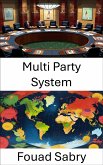Hung Parliament is a vital volume in the *Political Science* series. It breaks down the critical nuances of situations where no single political party holds a majority, offering readers an in-depth look into the mechanics of governance. Through examining key elections, coalitions, and the balance of power in parliamentary systems, this book provides a clear framework for understanding complex political dynamics.
Chapters Brief Overviews
1: Hung Parliament – Basics of a parliament with no outright majority.
2: Coalition Government – Formation and effects of coalition governments.
3: October 1974 UK General Election – The 1974 UK election and its historical relevance.
4: Minority Government – Challenges faced by minority governments.
5: Lib–Lab Pact – The 1977 Lib–Lab Pact and its impact on governance.
6: 2010 UK General Election – The election that resulted in a coalition government.
7: Confidence and Supply – Agreements ensuring minority government stability.
8: 2010 UK Government Formation – Negotiations behind the 2010 coalition.
9: 2015 UK General Election – Political shifts from the 2015 election.
10: Lib–Con Pact – The 2010 Lib–Con coalition agreement.
11: Politics of the UK – An overview of the UK’s political responses to hung parliaments.
12: Politics of Norway – A look at Norway’s coalition politics.
13: Politics of Barbados – Barbados’ approach to political stability through coalitions.
14: By-Election – The role of by-elections in changing political outcomes.
15: Folketing – Denmark’s Folketing and its coalition politics.
16: Snap Election – The strategy and implications behind snap elections.
17: James Thomas Milton Anderson – His influence on political theory.
18: Opinion Polling for 2010 UK Election – Polling’s influence on the 2010 UK election.
19: Balance of Power (Parliament) – How power dynamics shift in hung parliaments.
20: List of UK General Elections – Historical outcomes of UK general elections.
21: Successful Votes of No Confidence in UK – Key no-confidence votes that changed British history.
Hung Parliament presents a comprehensive analysis of coalition politics and parliamentary systems, designed for anyone keen on exploring political science in depth. Whether a student or professional, this book is a resource for understanding the inner workings of coalition governments and how they shape governance in various nations.
Chapters Brief Overviews
1: Hung Parliament – Basics of a parliament with no outright majority.
2: Coalition Government – Formation and effects of coalition governments.
3: October 1974 UK General Election – The 1974 UK election and its historical relevance.
4: Minority Government – Challenges faced by minority governments.
5: Lib–Lab Pact – The 1977 Lib–Lab Pact and its impact on governance.
6: 2010 UK General Election – The election that resulted in a coalition government.
7: Confidence and Supply – Agreements ensuring minority government stability.
8: 2010 UK Government Formation – Negotiations behind the 2010 coalition.
9: 2015 UK General Election – Political shifts from the 2015 election.
10: Lib–Con Pact – The 2010 Lib–Con coalition agreement.
11: Politics of the UK – An overview of the UK’s political responses to hung parliaments.
12: Politics of Norway – A look at Norway’s coalition politics.
13: Politics of Barbados – Barbados’ approach to political stability through coalitions.
14: By-Election – The role of by-elections in changing political outcomes.
15: Folketing – Denmark’s Folketing and its coalition politics.
16: Snap Election – The strategy and implications behind snap elections.
17: James Thomas Milton Anderson – His influence on political theory.
18: Opinion Polling for 2010 UK Election – Polling’s influence on the 2010 UK election.
19: Balance of Power (Parliament) – How power dynamics shift in hung parliaments.
20: List of UK General Elections – Historical outcomes of UK general elections.
21: Successful Votes of No Confidence in UK – Key no-confidence votes that changed British history.
Hung Parliament presents a comprehensive analysis of coalition politics and parliamentary systems, designed for anyone keen on exploring political science in depth. Whether a student or professional, this book is a resource for understanding the inner workings of coalition governments and how they shape governance in various nations.








